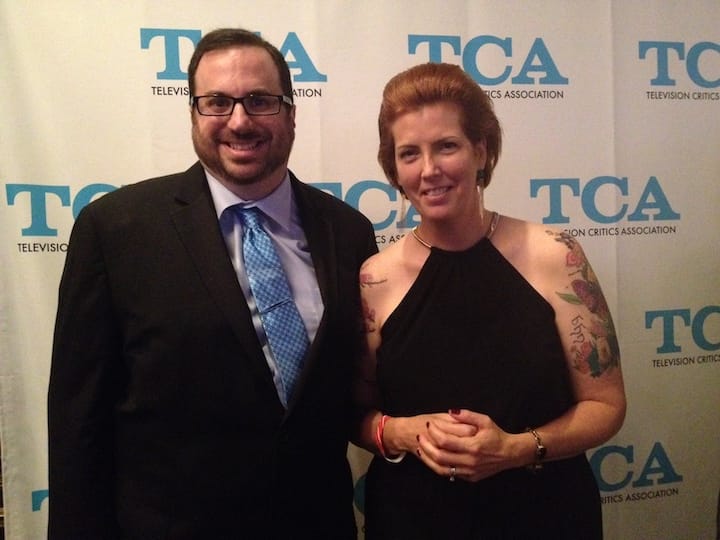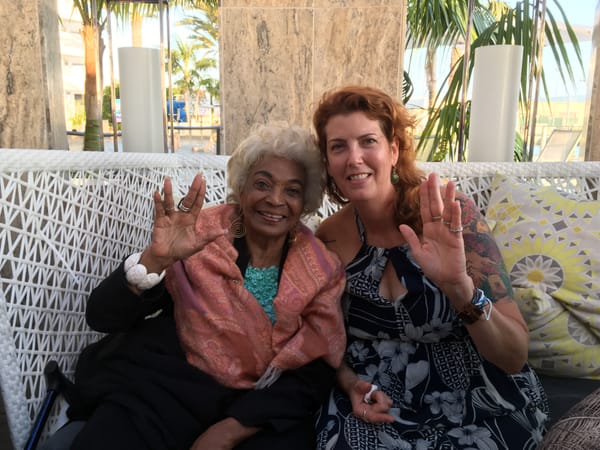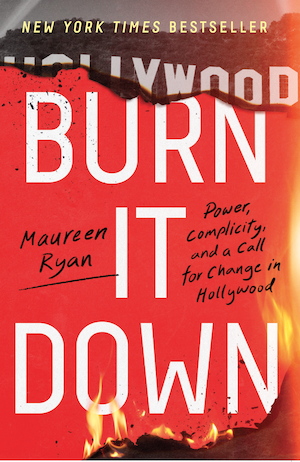On the firing of Alan Sepinwall, the scary place we're in, and attempting to de-stupid the media

The past decade or two has not been a good one for members of the media. And it keeps getting worse on a lot of fronts. Cultural coverage in particular has been stomped pretty thoroughly, in dribs and drabs over the years, and then rather decisively in recent months.
The New York Times pushed four respected critics out of their jobs, for reasons that seem specious and shortsighted, and the way it was done could not have been more disrespectful of those folks’ excellent work. Book criticism is going by the wayside (joining paid music criticism, which has long been on the ropes). Vanity Fair (where I’m a contributing editor) has seen an enormous number of excellent writers and editors walk out — or be pushed out — in the past year or two, and that unpleasant parade was capped by the recent firing of Richard Lawson, a wonderful critic.
And now the ax has come for Alan Sepinwall, who was let go by Rolling Stone out of the blue. He's done nothing wrong (quite the opposite); the powers just decided to lay off him and other respected staffers. I have worked with words for more than 30 years, but I’m having trouble finding a way to express how profoundly stupid and gross it was to just ditch Alan.
Sunday night, The Pitt won the Best Drama Emmy. Critics and TV reporters championing that show helped make it much more well known. That’s a lovely thing. And then, to find out one of its core champions was kicked to the curb a day later? Awful.
Alan is one of my best friends, and I’m lucky to be able to say that. But before I ever met him, I admired his writing, his insights, his willingness to engage with readers, and his knowledge of television and its history. His work ethic, on top of all that, is legendary. We’ve served in the trenches of TV coverage for decades together, and through it all, his deep love for and knowledge of the form has come through in every article and book he’s written, as has his sense of humor. If you’ve ever thought, “Alan seems like a mensch,” he is.
To cut him loose is just so unbelievably dumb. Not to mention undeserved, callous and disrespectful. Nobody I know who does culture writing can quite believe this happened to such a kind, knowledgeable, hardworking person. If he is not safe, absolutely nobody's jobs or freelance gigs are even remotely safe – and of course, these kinds of jobs were very precarious to begin with. (Am I going to be petty and note that the company that just unconscionably fired Alan with no notice also drove away myself and many other talented people in the last several years? Nah, I will not spend a whole lot of time being that petty. Not publicly, anyway.)
Rather than continue to rail against this particular example of media-industry, failson-infused idiocy, I will go down a different road and offer some ideas on how to fight the darkness. Tl;dr: I humbly ask that, if you can, please pay writers, artists, creators and publications that bring value to your day and to the world in general. There are a lot of them.
One obvious recommendation: Subscribe to What’s Alan Watching. Alan is among those who pioneered TV blogging, and now you can have all that entertaining goodness in your inbox regularly. In his post today, he explains what you'll get with the two subscription tiers he's offering. I subscribe, and if you have the means to do so, I hope you will too.
Another thing I want to say ties into a thing I told a bunch of friends the other day, when we were talking about that guy who died last week. I won’t go into that here, because as a lady writer on the internet for many eons, I’ve fielded enough creepy threats for several lifetimes.
These friends are smart, educated people. But unless you are a media-studies person, you may not have thought much about a phenomenon that has quietly unfolded over the years: Each person has an information environment or ecosystem around them, and from a number of directions, there have been successful efforts to degrade, skew or destroy those environments. Nearly a decade ago, I said the Gawker-Thiel decision boded very ill for American media. I hate that I was right about that, and now we're living inside the perilous outcome of that and other scorched-earth campaigns like it.
For example, Elizabeth Spiers wrote a very fitting piece about that person who died. And then, after the essay came out, Spiers was subjected to a hate campaign. She was threatened by a lot of awful people — and I wish I could say I was surprised by that. Many folks have recently gotten an education about the various fascist subgroups that have been proliferating in America in the past decade or two (and which of course have roots that reach deep into this nation's past). But there are quite a few of us who’ve had to know about this shit, because we’ve been writing about it or enduring attacks from extremely unpleasant troll armies for a long time.
Last week, a piece I wrote about Gamergate in 2014 got some traction again, and as I noted on social media, for a decade, I’ve been horrified that the handbook for that online hate movement is now, all too often, the operating system of this country. In the media, in government, in business and elsewhere. Target the apostates, the ones who engage in wrongthink. Destroy their lives, if possible. I bring that up in connection with Spiers’ post, because she’s unprotected in all the way professional hatemongers almost never are. (The least protected of all, of course, are Black women, trans folks and others from historically excluded groups who talk or write about almost anything, but especially if they delve into the actions of people with power in ways those people don't like.)
Spiers is good writer and a veteran of many publications, but she is not insulated or lavishly compensated, certainly not in the ways the leaders of various grievance armies usually are. This nation's vice president just went on the podcast of the guy who died in order to denigrate Spiers, who said she has to "hustle for other work in order to afford to freelance on top of it. I don't make enough money *just* as a writer to sustain." (You can support her here and via this publication she helped found.)
It's only Tuesday, but this week really went hard in terms of shitty media developments. Last week, Washington Post opinion writer Karen Attiah soberly pointed out that many in this nation have an unfortunate tolerance for gun violence — comments that received "virtually no public backlash." And yet she was let go from the Post for stating her opinion (which was right there in the job title). She also pointed out that the murder of a Minnesota legislator and her spouse did not get anything like the response this latest killing is getting. Oh, and she simply quoted some of that guy's words. I'd love to be able to say she's the only person who got fired after doing that last thing. I cannot.
The termination letter from her employer is so preposterous that all the attorneys I follow were falling out of their chairs. Like so many high-profile Black women, Attiah is often a target of insults and threats – but the Post's missive accused her of putting Post employees in danger. What. The. Actual. Fuck. It's corporate DARVO. As I said, Gamergate never ended. It put on a tie and went to Washington. (You can support Attiah through her teaching and her newsletter.)
All of these things I've mentioned are not the same, but they are all connected. Every day, the worst folks get louder megaphones and bigger platforms and paychecks, and the best and bravest people have their platforms taken away. Out of stupidity or a desire to speed-run us even faster into autocracy. Out of greed or fear or both. At best, they are treated like trash and discarded. At worst, they are targeted and excoriated and removed – sometimes by mobs baying for their heads, sometimes by their own employers.
Every. Day.
There are fewer and fewer journalists paid to tell the truth, dig up unfortunate but relevant facts and state those facts plainly. Getting paid to write stories, opinions and critiques of all kinds is becoming more rare than it should be (unless those pieces buff the egos of generally wretched people). Private equity, stupid rich people and other destructive entities have decimated the news media. For those who remain, it’s scary. Everyone I know with a staff job is nervous about getting fired for no reason — or for simply saying what they think. (And all along, the silence from well-paid pundits supposedly in favor of "free speech" has been deafening.)
Even if management doesn’t come for the jobs of those who attempt to speak truth to power, it can still be a terrifying thing to do. It was that way when I wrote that Bush's response after Hurricane Katrina was less impressive than Oprah's, who rolled up to the Superdome with trucks full of aid (I was painfully and unforgivingly raked over the coals for that opinion piece, not just by a segment of the public but by my bosses at the Chicago Tribune. I stand by every word of it.) It was like that when many of us took on Game of Thrones' and other shows' obsession with problematic depictions of sexual violence, or (checks notes) questioned Walter White's narcissistic decision-making, and put up with months of abuse for the trouble. Things have gotten worse since then. Much worse.
As Spiers put it, the "few of us with platforms say these things and get brigaded because there aren't enough of us and we have to absorb more threats as a result. The right doesn't have this problem because A) it's not the left that stockpiles guns and sends people they don't like threats to shoot them and their entire family, so the worst they get is rudeness, and B) there are so many places for people like K*rk to air their views and lots of money.”
Exactly. For decades there has been a very large money spigot open to those who are willing to sow hatred, bigotry, inequality and intolerance. Some of those ideas, in some places, are presented cleverly or prettied up a bit, but much of it is plainly fascist or fascism-friendly. And it can be quite lucrative to be in that business. Not so much being a plain ol' reporter or critic, stating facts and making necessary arguments without fear or favor.
But wearing an expensive tie or trendy sneakers while peddling white supremacy, transphobia, eugenics or any number of gross, bigoted beliefs? That, that can make you money. The rich have long been willing to throw a lot of resources at those projects. And part of the reason those lanes thrive is because a lot of the most influential people in mainstream media have decided that spreading odious beliefs on podcasts, in YouTube channels, on social media, via an endless array of "news" shows, websites and think tanks is all just part of healthy and productive public conversations.
Which, come on, that is ridiculously naive. Reply guys and "Debate me!" types exist to waste time and sap will, and that doesn't change no matter how much they scale up that dynamic. None of the very worst people are actually interested in good-faith debate, and believing and saying otherwise is not just dangerous, it actively helps fascists, bigots and their movements thrive. They don't always need to launder their bigotry because gatekeepers making six and seven figures are cheerfully doing it for them. "But the man who called Black people subhuman was nice to me" – do these people hear themselves? Apparently they are paid not to.
This brunchlord obliviousness is everywhere, especially the higher you go on various mastheads. As editor Kate Tuttle put it so aptly: "I shouldn't be shocked, but I'm still always brought up short to realize how many people think 'civility' means 'white people speaking in relatively calm voices; no matter what vile shit they say.'" Or here's Hari Kunzru putting it even more bluntly: "I am advocating for you to be killed but I am using my inside voice – you must debate me – this is called democracy." At this point, I'm getting dangerously close to ranting incoherently and/or getting doxxed, so I'll just direct you to what this pastor said.
Telling the truth matters. The jobs we do in these media trenches... they matter. How do people define "freedom," "freedom of speech," "patriotism" and "loyalty"? Culture deeply shapes those concepts, and critics can tell us how and why. Reporters can illuminate what's gone wrong and needs fixing. Opinion writers can identify current-event red flags as well. But many of these best people in these fields are being fired or silenced, or are unable to pay their bills.
It really is all connected, and this is the part that scares me most. Scientists, professors, writers in various media ecosystems, creative artists in Hollywood, historians, authors – all over the place, the people that supply context and help us create and comprehend meaning are being put on lists, fired, driven out of their jobs by layoffs and contractions, or even persecuted by hate mobs. Meaning and shared reality are and even should be contentious things, but they're being manipulated, twisted and destroyed on a scale I find hard to comprehend. Most elites' willful blindness and passivity about what is actually going on is enraging – and just as hard to wrap my head around.
(Related: Can the big-time publications that have consistently abetted all this please stop using words like "controversial," "provocative" or "polarizing" to describe things and people that are fascist, bigoted or tyrannical? Speaking of meaning, words mean things! Use the right ones! Say abhorrent or horrific when it's called for, don't hide behind "unprecedented"! I swear, some people are so deeply committed to not facing reality that one day a well-paid pundit will be writing a wildly obtuse column about an " unconventional rule-breaker" as that dictator's masked goons arrive to drag the pundit into the unmarked van. "How provocative," he'll attempt to type, as they smash his laptop, break his jaw and slap on the handcuffs.)
In any event, it serves quite a few purposes to keep pumping hate, vitriol and fear of the Other into various ecosystems and platforms (all while funneling the money from those systems into the pockets of already wealthy people). Populations are easier to control if people don't know relevant and important information, if they don't understand the world, if they don't have meaningful connections to each other and to the stories (fictional and non-fictional) that are all around them. Keep people atomized, awash in misinformation and propaganda, and in a state of fear: It's a game plan that has worked in the past in many places, and it is being put into overdrive right here, right now.
The loss of critics and culture writers may seem like a small thing within these larger trends. But it’s also scary and sad, and it matters. I’ve staked my adult life on the idea that writing about culture makes a difference and is necessary. It can also be really damn fun! But I've also, at times, risked my mental and physical health to put forward necessary truths, to shout from the rooftops that the way to solve a problem is to start by accurately describing it.
I still believe all that as much as I ever did. And I think a lot of people who love TV, film, books, theater, music — all arenas where paid, professional critics who know context and history are more rare by the day — agree with me. For reasons best understood by moguls and their lackeys, the people who run the media simply find people who do what we do either annoying or unprofitable. Extraneous. I don’t think readers agree. I truly do not.
These trends are, of course, driven by billionaires, greedy finance people and feckless Silicon Valley types, all groups whose actions belie their core beliefs. Which are: telling necessary or difficult truths does not matter; supporting art and true originality is a waste of time; nurturing thriving, inclusive and vibrant cultures is pointless. They care about money, power, influence and access and the ability to dominate and control others, the end. I cannot tell you that I have a comprehensive solution to all that.
I could futilely wish for some Richie Riches to the left of Hitler to fund a new array of excellent, well-staffed media projects – the talent is certainly available to start a dozen new publications. But if it hasn't happened in a major way by now, more than a decade into a comprehensive attack on democracy, it ain't happening now. No, what's happening now is that incompetent buffoons who tell the superwealthy what they want to hear are being promoted and rewarded at every turn.
The folks controlling the functional money spigots — starving out people and publications trying to do good work and rewarding those who sow hatred, misinformation and bigotry, and who embrace nihilism or willful obliviousness — have been running the show for a long time.
But I have a couple suggestions on how to help. First of all, we don’t have to accept that the worst, dumbest, meanest people are gonna win. Never have, never will.

Second, if you are subscribing to publications, platforms or services that are feeding or rewarding the worst tendencies in our society, in Hollywood or in the media, you can end those subscriptions! Not everyone will be able to do that on every front, but voting with our wallets can make a difference sometimes.
And then if you can, reward those who deserve it – folks creating art you enjoy, and work of all kinds that brings you pleasure, relevant information, thoughtful analysis or vital storytelling. Subscribe to independent media. There’s a lot of it, covering many localities and topics (here in Chicago, I’m a fan of Block Club Chicago and South Side Weekly, among others). I don’t necessarily endorse every person or publication on this next list, but there are a lot of good publications here.
And on various artist, writer, creator and newsletter platforms, there are even more good voices and visions to check out. Maybe those huge organizations that are busily bending the knee or firing all your favorite smart people won't care if you ditch them. But your subscription dollars can make a palpable difference to individuals and to indie media organizations.
Whatever publications you read and value, whatever writers, creators or artists matter to you, pay them if you can. Boost them, tell people about them, and maybe they'll grow. We can't fix all of it today. But we can do this.
As always, thanks for listening.



